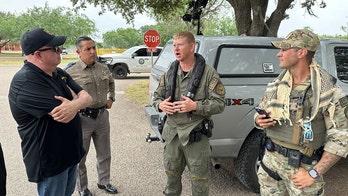INDIANAPOLIS – Indiana voters ousted two Republican legislators who helped keep a gay marriage ban off the November ballot, but most incumbents prevailed Tuesday in a primary election lacking a galvanizing issue or marquee statewide race.
Social conservatives in northeast Indiana helped tea party candidates defeat Reps. Rebecca Kubacki of Syracuse and Kathy Heuer of Huntington. Both women voted in favor of a measure that delayed, at least until 2016, an effort to let voters consider whether to amend the Indiana Constitution to solidify the state's gay marriage ban.
But another lawmaker targeted for the same vote, Rep. Casey Cox, R-Fort Wayne, held off challengers in the primary race.
Economic concerns weighed heavily for the small number of Indiana voters who hit the polls.
With no statewide contests on the ballot, the 2014 primary season was far quieter than two years ago, when tea-party-backed state Treasurer Richard Mourdock defeated longtime U.S. Sen. Richard Lugar in the GOP primary. Mourdock lost to Democrat Joe Donnelly in the November general election.
This year's election is largely focused on races for the state Legislature -- all 100 House seats are open, along with about half of the state Senate seats. Indiana's nine members of Congress all make it through their primaries unscathed, allowing them to prepare for November battles.
Most members of the Legislature who faced tough challenges survived the night.
House Speaker Pro Tem Eric Turner, R-Cicero, turned back Sheridan architect Parvin Gillim. Turner was cleared by a House ethics panel after privately lobbying to protect millions he earns through the nursing home industry.
And State Sen. Jim Merritt, R-Indianapolis, fended off tea party challenger Crystal LaMotte.
"I don't think there are any really hot buttons so to speak to push," said Jack Hart, 69, who was working at Westfield Town Hall as a Republican election inspector. "The most part the people who are in the offices in the party I'm involved with, Republican, I'm happy with."
For Republicans, a supermajority in the state House hangs in the balance. The supermajority allows Republicans to conduct business without worrying about minority Democrats stalling business by walking out, as they did during labor battles in 2011 and 2012.
As of early Tuesday evening, a handful of tight Statehouse races hung in the balance.
In the state Senate, John Waterman, R-Shelburn, was facing a well-organized and well-funded opponent in Washington City Councilman Eric Bassler. Indiana business interests and some of the political staffers associated with former Gov. Mitch Daniels were helping Bassler. Waterman, a financial adviser, considered a run against Daniels in the 2008 primary but ultimately stayed out of the race.
House Education Chairman Robert Behning, R-Indianapolis, picked up a surprisingly strong challenge from Michael Scott, a union electrician who has gained the backing of the state's unions. Conservative education overhaul supporters have flocked to Behning's defense; the Indianapolis Republican was instrumental in the passage of sweeping changes in 2011 and has continued pushing for expansions of the school voucher program.
For most of those drawn out by any specific issue, it was the economy, even though Indiana's unemployment rate was 5.9 percent in March, well below the national level and some of its neighboring Midwest states.
Turnout on Tuesday was light though workers in some precincts said that was typical for a midterm election. At one location at the Indiana State Fairgrounds, only 10 people had voted during the first three hours. By 3 p.m., only 53 people had voted at a precinct in the Indianapolis suburb of Westfield.
The election process seemed to be running smoothly, with officials reporting a few problems with voting machines, none of which disturbed the small number of voters who turned out. Erin Kelley, spokeswoman for the Marion County Clerk's office in Indianapolis, said 295 of Indianapolis's 296 polling locations opened on time. One polling site opened late because an election worker had trouble finding transportation.
The winners of Tuesday's contests will head to November showdowns. Next up for the Republican and Democratic parties are nominating conventions this summer, where party activists will decide who runs for auditor, secretary of state and treasurer.




